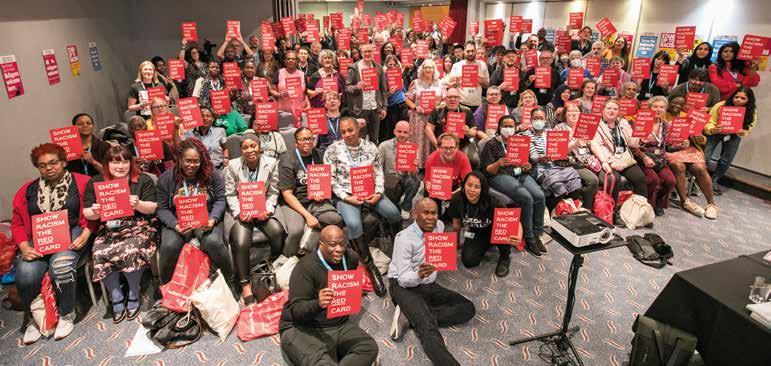
9 minute read
Gordano strike threat
News
Strike threat puts workload woes in focus
THREATENED strike action over unsustainable workloads has caused management to back down at Gordano School in north Somerset.
Workload concerns at Gordano School stretch back several years. In autumn 2019, members formally approached management about the issue and outlined ways a reduction in workload could be achieved. These included reducing the number of additional lessons, staff briefings and working hours on days with parents’ evenings.
However, at the time little was done to resolve the issue by the employer.
Staff then worked increasingly long hours throughout the pandemic to the point where members said it was not acceptable or sustainable. Ted Powell, joint NEU rep at the school, said: “Staff were feeling overworked and stress levels were rising.”
On returning to school in September 2021, members renewed their campaigning efforts to reduce workload. Although the employer made some changes initially, staff felt it was not enough to make a sufficient difference and so, in January 2022, NEU members successfully balloted for strike action.
“The one trait you need as an activist is persistence. Balloting was a big step and many members felt uncomfortable with taking action that could disrupt their pupils’ education,” said Ted. Despite these concerns, 90 per cent of members voted for strike action.
They announced six days of strikes, forcing management to return to the negotiating table and, at the 11th hour, management agreed to all members’ demands.
“The dispute was a stressful time for everyone involved, but when it was finally resolved members really did have a spring in their step knowing that their collective action and strength had brought about positive change in the workplace,” said Ted.

A long battle, but unity and solidarity prevail at Chingford
NEU members at South Chingford School in Waltham Forest have postponed their seventh day of action as management agreed to the majority of their demands.
Members at the London secondary school and sixth form college, which is run by the Chingford Academies Trust, had been raising concerns over workload, health and safety and staff wellbeing for several years. Threatened redundancies in the PE department then caused members to rally together and successfully ballot for seven days of strike action.
Staff had 16 concerns, including a proposal to increase weekly teaching hours; issues over appraisals for support staff; playground safety; and a lack of a formal consultation process for staff threatened with redundancy.
“Until we decided to strike, management didn’t take any notice of us,” said Paula Smith, support staff rep.
Paula is one of three NEU reps. Her colleague, Katharine Hinds, who is health and safety rep, said: “The solidarity between the three of us has had a huge impact. I think it’s important to encourage schools to have more than one rep so they can support each other.”
After six days of strike action, a meeting with the Advisory, Conciliation and Arbitration Service (ACAS) led to management agreeing to the majority of members’ demands. These included an agreement to keep the teaching week to 20 hours; individual risk assessments for staff; a stress survey; proper payment for part-time staff; and the establishment of a joint trade union employer group that will have regular meetings with the trust’s chief executive.
NEU rep Alison Stirling said: “All we want is a happier, healthier school and we’re finally being listened to. It’s been a long battle but the members have achieved so much through their unity and solidarity.”

Child Q: right to respect & dignity
HUNDREDS of protesters gathered in front of Stoke Newington police station in London on 18 March to express their anger over the strip-andsearch of a Black school girl by police. The 15-year-old, known as Child Q, was strip searched by Metropolitan Police officers – who knew she was menstruating – at her school without another adult present.
The union said: “The NEU is appalled by the findings of the Local Child Safeguarding Practice Review into the treatment of Child Q. Students have a right to be treated respectfully and with dignity at all times and for their wellbeing and safety to be top priority.
“We extend our full sympathy and solidarity to Child Q and her family and echo their calls for this never to
happen again.” PHOTO by Guy Smallman
An urgent motion on police in schools after the Child Q case was debated at conference. See page 12.

PRIMARY educators are being urged to share their experiences of statutory assessment with a commission set up to evaluate the purpose and relevance of high-stakes tests such as SATs.
The commission, which is being co-ordinated by the NEU, will also propose a new system of assessment more suited to children’s needs.
Speaking at its online launch in March, joint general secretary Kevin Courtney said: “Education Secretary Nadhim Zahawi says he is driven by evidence. Will he appreciate the evidence we can produce about the negative effects of our school system?”
London primary teacher and commission member Megan Quinn said teachers carry out formative assessment all the time, but that a commission on high-stakes tests is “desperately needed”.
In a plea to members to contribute to its work, she said: “We have a lot of power as a collective. There is something we really need to challenge, which is that if you are anti the current forms of assessment, you’re not pro high standards.”
Currently, assessment is simply to provide data for the DfE.
The Baseline testing this September hadn’t been useful for teachers and had interrupted children settling in, said Megan. “These children have been through so much in the past couple of years and they had to do this assessment in quite a sterile, alien way.”
Commission co-chair and former primary teacher professor Alice Bradbury – who is based at the Institute of Education in London and has been researching assessment for 14 years – said the commission wanted to find a workable reform to the system.
“We don’t want to do away with assessment but have assessment that is an aid to learning rather than to simply provide data for the Department for Education,” she added.
Also speaking at the launch, Jill Robinson, of coalition More Than A Score, presented findings from a new survey of more than a thousand heads, senior leaders and teachers. It found 92 per cent do not believe preparing for SATs helps learning, and one in three heads have been contacted by parents worried about the effects of SATs on their child’s wellbeing.
“Please write to your MP. It really is a numbers game,” she said. “It’s really important your voice is heard.”
More schools drop pension exit plan
TWENTY-FIVE independent schools have been forced to drop plans to exit the Teachers’ Pension Scheme (TPS) after NEU members took strike action. Independent schools across the country are trying to leave the TPS, arguing that it will be unaffordable if the employer contribution increases when the scheme is re-evaluated next year. n See feature on page 26
Calling time on 30 painful years of Ofsted
NEU joint general secretary Mary
Bousted argues it is time to end the tyranny of
Ofsted.
OFSTED is 30 years old this year. This is no cause for celebration for the generations of teachers and school leaders who have sweated under the yoke of its tyrannical inspection regime.
School leaders, whose future job prospects rest on getting a good Ofsted judgement, pass their terror down to teachers. The Ofsted inspection framework rules. Its decrees must be obeyed.
The problem for everyone involved in the whole sorry process is that Ofsted is unable to make up its mind about what it counts as evidence. Ofsted has run through five different inspection frameworks in nine years as it casts around for a methodology which it can defend as valid (that is, its inspections are a good measure of education quality), and reliable (that is, would two Ofsted teams inspecting the same school come to the same judgement about the quality of education it provides?).
How can judgements mean anything over time when the inspection framework changes every other year?
86% cite harmful workload and stress
Of the NEU members who responded to our State of Education survey, 77 per cent disagreed with the statement that Ofsted contributes to school improvement. An incredible 86 per cent believe that Ofsted inspection introduces unreasonable or harmful levels of workload and stress. Seventy-six per cent think that Ofsted is not independent of Government.
These are shocking findings – but they are not surprising. Professional distrust of Ofsted has grown throughout the 30 years it has been in existence. The gulf between the profession and its inspectorate is now a chasm.
Dear reader, sometimes the self will intrude. So now let me confess that I am a survivor of 25 Ofsted inspections during the period in my career when I worked in departments of education at universities, training teachers.
During that period of intensive and frequent inspection of initial teacher training courses, I am very willing to report that I did meet some excellent inspectors – ones that were thorough, reasonable, knew their subject and reported fairly and accurately.

Mary speaking at the NEU annual conference. Read more on pages 12-17 PHOTO by Kois Miah
The good, the bad and the incompetent
But I also met too many inspectors with weak subject knowledge, with distant teaching experience, with poor analytical skills and terrible communication skills. I met too many inspectors who should have been nowhere near education – never mind inspecting education quality.
So, based on my own exhaustive professional experience, I am certain that Ofsted has major problems with quality control of its inspectors and that those problems go right up to the top – to Her Majesty’s Inspectors.
The problem for leaders and teachers is that they do not know which Ofsted team will turn up at their school gate. Could it be a team that knows what it is about, understands the context in which the school works, is prepared to listen and to come to a fair judgement?
Or could it be a team which has made up its mind before it enters the school gates? A team which resolutely refuses to listen, and treats staff with disdain and contempt? I have heard of far too many Ofsted teams who behave unprofessionally and inappropriately. I am now hearing of schools getting poor inspection judgements because selected pupils, under the glare of the inspectors’ gaze, are unable to recall facts they were taught over a year ago, in the middle of a pandemic.
Time to replace Ofsted
The NEU believes that it is time to end the tyranny of Ofsted. And so we have launched our petition to replace Ofsted with a system of school accountability which is fair and reliable, and which works with teachers and leaders to support improvement in schools, in the local area and across the whole education system.
Please sign the petition (page 46) – it already has tens of thousands of signatures. Let’s get it to hundreds of thousands and make the case for change so strong that it has to be heard.
It is time for teachers to regain their sense of professionalism. For teachers to be given the space to make informed choices about teaching and assessment methods which are suitable to the topic being taught and the pupils who are learning.
It is time for the profession to regain some confidence in the choices it makes – to regard accountability as something which is necessary and useful, rather than a terrible burden.










